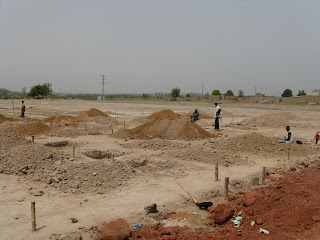Week #38 An Encounter with the Master Fulani Griot Mr. Boubacar Hamadoun FaranaIf you spend any time in a Fulani village you will quickly be exposed to a form of music called "Hoddu." Fulani Griots, called Maabudjos, make their living by traveling from town to town across the African bush with their small banjo-like instruments recounting village histories, showering praises on local chiefs, and reciting the tales of 18th century Fulani warlords. When it comes to Fulani Maabudjos the name Boubacar Hamadoun Farana's is at the top of the charts. A direct decendant of Fulani warlord Hambodedjo Hammadi's griot, Boubacar is celebrated for his knowledge of Fulani history, which he weaves together in poetry-slam style in the Fulfulde language. In some Fulani regions of W. Africa it is fair to say that he has stood alone at the top of the Fulani music charts for over two decades. I was first exposed to the griot music of Boubacar Hamadoun Farana in Southern Niger in the early 1990's. In the small village of Gueladio his cassettes were essentially the only "music" people listened to. During that time I purchased half a dozen of his tapes and did my best to make sense of his quick proveb-laden stories.
Jumping ahead almost 20 years... For the past several months I have been working with Bamako's Fulfulde radio station, FM Tabital Pulaaku, to help them repair one of their signal amplifiers, and they recently invited me into their studio to DJ one of their morning time slots. Talking with the station manager I learned that Boubacar Hamadoun was back in Bamako between tours and would be coming by the station.
After spending a good hour chatting we then drove him back to his home to meet his family, and made plans to meet again for a hoddu lesson. For a small fee he agreed to come to our home with his hoddu and make a custom cassette. Watch the top 100 for his next big hit!

Boubacar Hamadoun with his famous "hoddu" in the studio of FM Tabital (106.5 on your FM dial!) with Ali Sare and station managers Samasekou and Makka Ba.
FM Amplifier Repair at a crude electronics shop on the outskirts of Bamako. FM Tabital should be broadcasting at full power (500W) again in a few short weeks!


Live at the FM Tabital studio making morning announcements with Ali Sare.
"Pullo Bamako fini ton! Jam walli e maada!"
(Fulani's of Bamako wake up! Good Morning to you!")

Here Boubacar plays a short song for Gus in our living room. He recently returned from France where he produced his first CD. Although he has made hundreds of cassettes over the past 35+ years (Boubacar is now 53), they are copied locally so he gets no royalties for his work.


Here is a short video clip of Boubacar playing my hoddu to give you a sense of the music.
Email us if you would like information on how to order a copy of his new CD!
_______________________________________________
Part 2: Another fun day rock climbing in Siby. Last week we brought a few of our Fulani blanket-weaver friends with us to rock climb. They are still raving about it (and recovering!)
Mamadou Sare and Maabel Drame make their way up the first pitch of a fun route named "Karamba Toure"


A very happy Ali Sare finishing "Karamba Toure"

A beautiful view of "L'arche de Kamadjan" looking west from the top of the first pitch of Karamba Toure

The prize of Siby! The two pitch "Chemin de Kamadjan" on the south side of the arch.


Starting up the second pitch

At the belay anchor just below the summit

Sunset under the Arch
















































